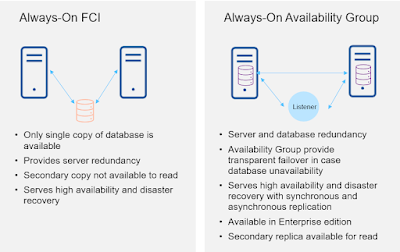There are two types of Always-On Microsoft SQL Server:
- Always-On FCI (Failover Cluster Instance)
- Always-On Availability Group
From a storage perspective, the key point is:
- Always-On FCI (Failover Cluster Instance)
- Uses shared disk.
- Always-On Availability Group
- Does not use shared disk.
1) If using the "shared disk" model, then, according to this VMware KB -
And the table in the Storage Configuration section - Clustered VMDKs are only supported on FC; and vVols or RDM physical mode, only with FC, FCoE and iSCSI.
Note: In-quest iSCSI is not mentioned in this table (since it is storage external to VMware), but it is another option and very commonly used, if you want a clustered/shared disk.
2) If using the "no shared disk" model, then any storage (VMware datastore type) is fine - NFS, iSCSI and FC. And this has been true for a long time. See this March 4, 2015 article:
"As a result, SQL Always-On Availability Group non shared disk deployments are supported by VMware when deployed in VMDKs on NFS datastores (as are Exchange DAG deployments).
NetApp SnapCenter Support
- SnapCenter supports the shared-disk model (1) with Virtual Machines with in-guest iSCSI.
- SnapCenter supports the non-shared disk model (2) with VMDKs on NFS/iSCSI/FC datastores, and in-guest iSCSI.
Note: Please check with NetApp if I've not mentioned your specific setup above.


Comments
Post a Comment